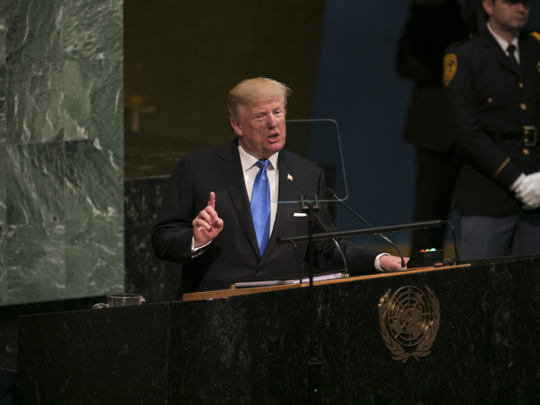
Divining the Trump Doctrine is, like reading tea leaves or crystal-ball gazing, the sort of activity that invites a healthy level of scepticism. A foreign policy doctrine is immutable, a fixed lens through which a president sees the world. The current US president’s nebulous flirtations with different policy positions and world leaders would therefore seem to make a Trump Doctrine a contradiction in terms.
I would argue that there is, in fact, a core ideology underneath Donald Trump’s flaky layers of personal animosity and poor impulse control. We can take the president at his word that he is proud to be an American, and that he believes the United States to be a global superpower with the potential to do extraordinary good in the world. But he is a nationalist, so his vision of this “good” is conditioned on Americans benefiting from any actions taken abroad. It is still unclear how exactly his cost-benefit analysis works, but we can guess from examples of Trump’s inaction (Myanmar being only the latest) that, at a minimum, American lives would have to be at risk for him to want to commit.
These are the classic tenets of American populism, and they create no small amount of cognitive dissonance among their adherents. The desire to see America as a superpower, and more than a smidgen of resentment about the blood and treasure that must be spent to maintain that status, are held in constant tension. We saw this on display at the UN General Assembly last week, as the president sought simultaneously to distance himself from, and to reform, the world’s largest intergovernmental body.
Threatening nuclear war, like banging one’s shoe on the table, is one way to train the spotlight on yourself at the UN — but as with Soviet leader Nikita Khrushchev’s famous outburst at the height of the Cold War, those who would focus only on him labelling Kim Jong-un “rocket man” will miss the greater point of Trump’s speech.
For the president spoke in favour of international cooperation, calling for a strong coalition of like-minded nations to work together to solve the world’s most pressing problems. He praised UN programmes which provide relief from Aids and malaria, and the extraordinary Global Fund to End Modern Slavery. But he did so from a distinctive position: for Trump, these global issues are the proper remit of multilateral institutions like the UN. Nation states should be left, where possible, to solve their own problems. He argued in defence of the prerogatives of national sovereignty, and made the case that a nation is the body best equipped to help its people, and its people are the best-prepared group to come to the defence of their nation.
In his view, nations are separated not by ideology or creed, but by whether or not they allow “individuals to flourish in the fullness of life intended by God”. This is how we should understand the president’s rhetoric on North Korea. While slightly bombastic, he was not wide of the mark: Kim Jong-un’s regime represents the gravest threat to global security today, and the dictator is the main impediment to his own country’s development. Through Trump’s lens of sovereignty and strength, North Korea’s continual missile launches do not look like a bargaining chip in a conversation about sanctions: they look like a direct provocation meant to scare American citizens. In a broader conversation about how people flourish, it is not unreasonable to point to North Korea (or Venezuela, or Cuba) as examples of regimes that threaten global prosperity — or to make a promise that, once those regimes are gone, the US will be there to help those people rebuild what socialism has destroyed. While rather rough around the edges, the foreign policy vision that the president described is perhaps more closely in line with core American values than anything espoused by his predecessor, Barack Obama, who was more warmly embraced by the international community. Freedom, democracy and the sacrosanct importance of every individual sit at the heart of American political life. The sort of freedom we enjoy in America is not simply a set of allowances, but also freedom from oppression, from hunger, from fear. Trump has clearly not given up hope that the world’s multilateral institutions can play a part in evangelising those freedoms. The call for reform of the UN, articulated by both Trump and Theresa May last week, is a show of faith that improvement is possible. To pretend that the organisation has fulfilled its mandate over the past 70 years is to gloss over its failures to its core constituency: the global poor.
— The Telegraph Group Limited, London 2017
Molly Kiniry is a researcher at the Legatum Institute.










